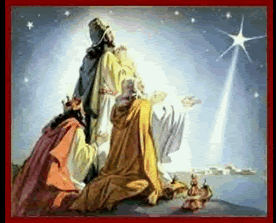From Christmas trees to candy canes, stockings to Santa Claus, Christmas is a holiday fraught with tradition. While there are countless articles and blogs that explain the history of each tradition for this season, at Scripture Dig we want to share with you a few traditions and ideas that focus on the Word of God while sharing the beauty of the Word-become-Flesh.
Our desire here is to encourage you to dig into Scripture and use that as the foundation for every aspect of your life. And during this time of year, we want to continue to point you back to the Bible as you celebrate this most precious holiday … the birth of our Lord.
The Advent Wreath
The Advent wreath is one of my favorite Christmas traditions. I remember the weekly lighting of the candles at my church growing up. There is something so beautiful about setting aside time to anticipate the Coming of the Christ. While the particular details of the Advent wreath vary in different church backgrounds, the foundation is the same. Beginning with the First Sunday of Advent, the lighting of a candle can be accompanied by a Bible reading and prayers. An additional candle is lit during each subsequent week until, by the last Sunday before Christmas, all four candles are lit. Some Advent wreaths include a fifth, “Christ” candle which can be lit at Christmas.
The Scriptures read with each candle are as follows:
- The Candle of Hope: Representing the hope and promise of the coming Lord, this candle reminds us of the hope we have in Christ and the promise of eternity with Him. Scripture associated with this candle includes Isaiah 11:1-10 and/or Isaiah 7:10-14, 9:6-7; Isaiah 11:1-5 and/or Jeremiah 33:14-16.
- The Candle of Preparation: Representing His light and our preparation, this candle affirms our own need to prepare for His coming. Scripture associated with this candle includes Psalm 25:1-10 and/or Psalm 27:1-7, 18-19 and/or Micah 5:2 and/or Matthew 2:1-12.
- The Candle of Joy: This candle reminds us of the joyful news the angel brought for all man. Scripture associated with this candle includes 1 Thessalonians 3:9-13 and/or Romans 15:4-13 and/or Matthew 1:18-25; Luke 1:26-38
- The Candle of Love: Representing the love of the Father, this candle reminds us of the great gift of God the Father and His love for us in sending His Son. Scripture associated with this candle includes Matthew 3:1-12 and/or Luke 21:25-36 and/or Luke 2:8-20.
Many traditions also include a fifth, center candle which is the Christ Candle. Representing the incarnation – the very meaning of this season – this candle reminds us of the Christ, the Spotless Lamb of God sent to pay for our own sin. Verses read with this candle include Luke 2:1-20; Psalm 100; Revelation 3:20-21.
The Jesse Tree
The Jesse Tree is a depiction of the lineage of Christ through Jesse, the father of King David. This beautiful tradition walks us through the genealogy of Christ and helps us gain an understanding of how all of Scripture breathes His name … from Genesis through Revelation, it is Him – Logos, the Word-become-Flesh – who is the promise and the fulfillment of the promise all in one.
The beautiful, full-of-grace Ann Voskamp has created an incredible {and FREE!} devotion book and set of ornaments to be used for a Jesse Tree and I highly recommend that you read the devotions even if you choose not to create an actual Jesse Tree. Walking through Scripture in this manner is a powerful way to prepare your own heart for the wonder and beauty of THE Gift of Christmas.
The Gospel of Luke
Last year, my husband mentioned he was reading the Gospel of Luke throughout December. There are 24 chapters of this book and so he would finish on Christmas Eve. I joined him in that endeavor last year and have continued that practice again this year. Reading through the life of Christ as we move closer to the celebration of His birth has been a transforming experience for me. I cannot begin to explain the depth of meaning I found last year as I took Communion during our church’s Christmas Eve service having just read of Christ’s resurrection earlier that day.
I encourage you to make Scripture an integral part of your Christmas preparation and tradition … and would love to hear from you of other ways you have incorporated the Word into your celebration.
{Image from msormann via flickr}









